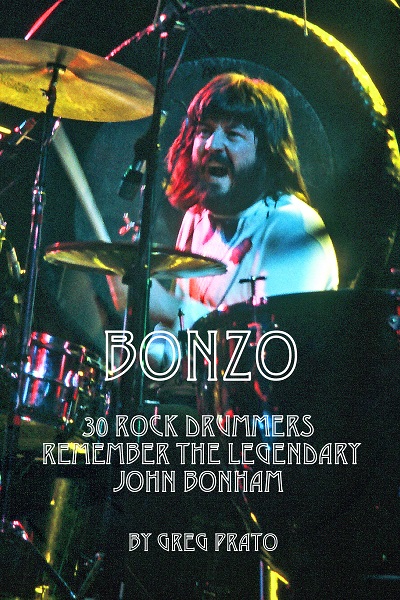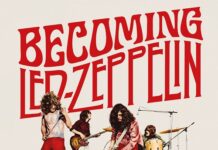September 25, 2020, marks 40 years since the passing of legendary Led Zeppelin drummer, John Bonham. To mark this event, respected author/journalist Greg Prato has assembled a new book, BONZO: 30 Rock Drummers Remember the Legendary John Bonham, which includes interviews with renowned drummers (Kenny Aronoff, Steve Gorman, Mike Portnoy, Frankie Banali, and Don Brewer, among others). Below is an excerpt, in which Triumph drummer, Gil Moore, recounts an interesting story about witnessing a live performance on Zeppelin’s first-ever North American tour…that almost didn’t happen! To order a copy of BONZO: 30 Rock Drummers Remember the Legendary John Bonham, click here.
###
Did you ever get the opportunity to see Led Zeppelin live with John Bonham?
GIL MOORE: I had an experience that was sort of “out of body” – when I look back on it. When I was a teenager, Led Zeppelin was playing a concert in Toronto – at the Masonic Temple [then called “The Rock Pile,” on February 2, 1969]. When I was a kid growing up, I had a piano teacher named Peter Goddard, who just happened to be the music critic for The Toronto Star.
As a result, I was hanging around outside the venue – because I didn’t have tickets – and Peter saw me. He had a press pass and kind of grabbed me by the arm, and said, “Just walk behind me and don’t say anything.” He ended up going through a door that led onto the stage. We were on stage right, and we sat on the stage itself. John was at center stage, so we were all of maybe 15 feet from his drum kit. So, I sat there.
There was some sort of a controversy, because the band wasn’t getting paid properly from the promoter. Back in the ‘60s, the promoter often wouldn’t have enough money, so he wouldn’t pay – and he would stiff the band. So, Peter Grant decided, “OK. No money, no Led Zeppelin.” The audience was then put in that position of, “We want the band. Something’s going on. Is anybody going to make an announcement…or are we going to start a riot?” I was too young to understand what was going on – but you get the gist of it.
Finally, the band refuses to play, they go back to their dressing room, there’s another huge delay. And then what next happened was someone stole the distributor cap off of their Ryder truck – so they couldn’t leave. I don’t know who did that, but finally, somebody went on stage – from the promoter’s side – and said, “Somebody has taken the distributor cap off Led Zeppelin’s truck. If we get that back, then the band is going to play…and if we don’t, then the band is not going to play.”
In the interim, they somehow must have come up with the money – because the money was no longer an issue. It was suddenly the distributor cap that was the issue! All this time, I’m crouching like a mouse, hiding behind Peter Goddard at the side of the stage – up against one of the walls in the proscenium. And then finally, after hours, they come out on stage, and I was positioned so I was about the same spot on stage as John – except that I was all the way stage right. So, I was essentially looking across the stage at everything he was doing, because I was trying to learn from him. That was the first interaction that I had – a kind of wide-eyed introduction to John Bonham playing drums.
What were some things you observed viewing him from the side of the stage?
GIL MOORE: He had a cadence that is like nature. I always think that drummers…there are some that are practitioners that are efficient on the mechanical level. But there are others that are efficient on an emotional level. And I would put him in that category, in that his playing would emulate the wind, the rain, the lapping up of waves. His playing really had a foundation almost in nature.
And aside from that fact, he was technically very proficient. His meter was very steady, and of all the fundamental or rudimentary aspects of playing drums, the affectations, the style, or the signature to me was that is what made him “John Bonham.” What I took away from it was the feel of what he was doing. Which, as I said, reminded me of what you learn from nature on days when the weather, the rain, the sun, the wind, the waves influence your feelings. That can be woven into a musician’s style. And I think that it – in droves – was what John embodied.
I can’t imagine what it must have been like to sit on the side of the stage and witness Zeppelin early in their career. Was it one of the best shows you’ve ever seen?
GIL MOORE: I think I was too young to understand what was going on. Upon reflection, I realize what it meant and not only how cool it was, but how influential it was – sitting there and taking that in. You’ve got to remember when you’re a young musician, that’s what you do – you follow your heroes, and you try to emulate your heroes. So, my life at that time was about trying to find the best drummers that I could listen to. It’s a magic experience when you’re very young and you’re learning and you get to experience greatness.




















